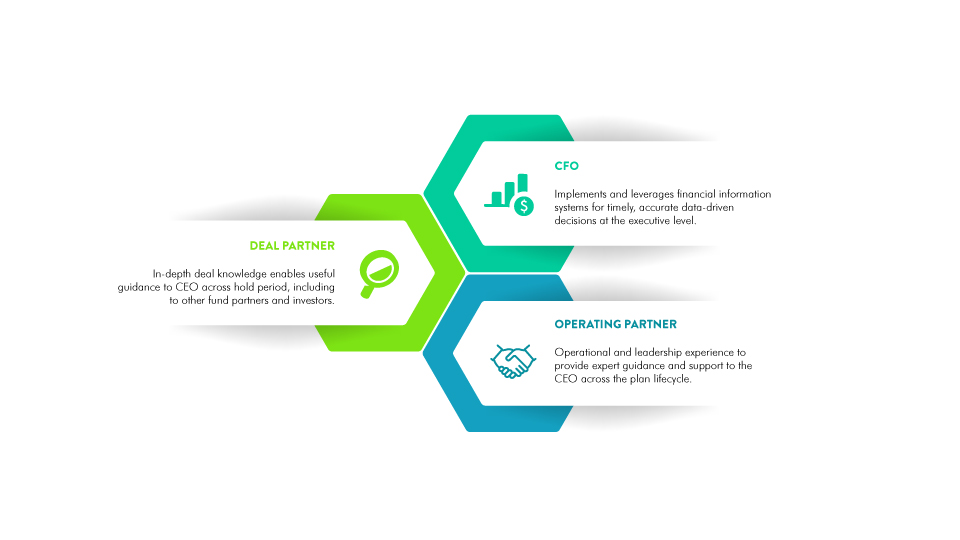The private equity formula is simple. PE investors expect their portfolio CEOs to drive positive, measurable changes that led to healthy exit options. In a majority of cases, however, that formula is being turned on its head, with the exits coming from the CEOs themselves (73% of them, to be exact) along with corresponding hits on costs, valuations, and plan goals.
Clearly, the formula needs to change, particularly in an era when mounting deal pressures and lengthening hold periods are creating a kind of perfect storm that could result in even more CEOs heading toward the exits.
How best to change the formula? By creating a targeted, tailored support structure that fully empowers and supports CEOs to lead their enterprises through their transformation plans – a structure that acts like a three-legged stool.
A Three-Legged Stool
Based on our years of experience in the PE arena, we believe today’s portfolio CEO needs targeted, tailored modes of support that, collectively, enable them to drive the kinds of enterprise transformation investors want.
You can think of this new support structure as a three-legged stool, the proverbial sum greater than its parts, each leg delivering support from a key deal stakeholder: the Deal Partner, the CFO, and the Operating Partner.

The Deal Partner has an intimate, soup-to-nuts understanding of the deal, beginning with the rationale for the acquisition itself and continuing with the mechanics through which the investment thesis will be delivered. As such, guidance and input from the deal partner is critical to recalibrating the value creation plan across the hold period as well as helping the CEO communicate with other fund partners and investors.
A critical member of the executive team, the CFO often has a lot of heavy lifting to do in providing timely and accurate information to the Board. Just as important, the CFO puts in place management and financial information systems that inform and support solid decision making within the business.
The Operating Partner is a key non-executive who has the operational and business leadership experience to guide the CEO through the value creation plan, support the development of additional strategic initiatives, and monitor the well being and performance of the CEO.
Rise of the Fractional CFO
While the initial stages of a plan will be established during due diligence, experience tells us that numerous issues – internal and external, opportunity and threat – will arise throughout a deal’s lifecycle. Naturally, plan success depends on leadership’s ability to identify and adapt to these issues as they arise (e.g. mitigate risk, leverage opportunity, and so on).
Traditionally, the CEO’s ability to roll with these changes has been abetted by the financial expertise of an experienced and competent CFO. Unfortunately, many PE deals – particularly in the lower middle market arena – lack the resources for a full-time CFO of this caliber.
Which is why we’re big fans of Outliers LLC’s new ‘fractional’ approach to CFO support. The PE deal and its CEO enjoy all of the benefits of a CFO with extensive PE experience, but primarily at those stages when such competencies and capabilities are most needed. The fractional CFO performs executive-level tasks as well as manages the financial staff and other associated functions within the company such as human resources and information technology.
By putting in place an experienced CFO who works closely with the CEO:
- Financial controls are implemented to stabilize the business
- Reporting functions are added to improve communication and transparency between management and the PE deal team (a critical source of friction behind many premature CEO exits)
- Decision making abilities are enhanced to drive value and keep the plan moving forward
Fractional OP + Fractional CFO = Attractive Exits
Our own experience serving as a fractional Operating Partner with CEO-level skills has proved rather conclusively that this model – which enables funds to retain OPs on a deal-by-deal basis – delivers precisely the experience and support CEOs need to drive plan success.
Furthermore, the steady presence, expert guidance, and industry knowledge of the OP not only enables the CEO to keep the plan moving forward, but it reduces rates of strife and turnover that have plagued a majority of PE deals.
Now, add to this mix a similarly experienced CFO also operating on a fractional basis, and the deal has in place two critical support structures that – along with the Deal Partner – give the CEO the support her or she needs to succeed while keeping costs and cash flow drains down.





